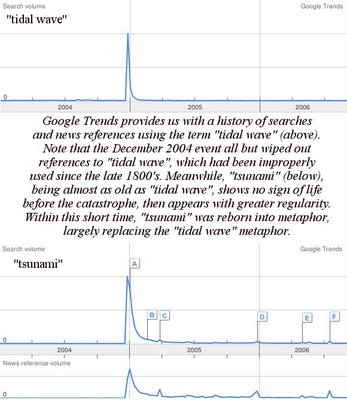Raising A Tsunami
Saturday, 11 November 2006
Rarely do we witness the conception, gestation and birth of a metaphor. Usually a metaphor slides into being, the product of say, poetry, witticism or observation. We grasp the conceptual links because the pathways in between are well worn: beaten subconsciously into life by familiarity; beaten to death by overuse.
Take this year’s favorites for the Top Ten List of Metaphors. All nuclear in domain, fusion, meltdown and fallout were born into metaphoric use years ago, only to achieve superstardom relatively late in life. Just like window did so many years before, having been long confined to the nerdly monastery of old-school computer labs.
A new metaphor typically derives from two old concepts. It’s not to say that the connection or conclusion made isn’t new, only that for metaphor it really takes two to tango – Lakoff’s “source” and “target”. If you don’t have at least some amount of turf on each side, the equation being made drifts around with all the deeper meaning of a word from an unfamiliar language.
For many, tsunami was an unfamiliar word. The concept of a tidal wave was familiar to us all, however variant and technically debatable our individual understanding may have been. We all agreed it was – at least figuatively – a tragic upheaval of some kind, leading to the broadly accepted tidal wave metaphor. So as newscasters pumped the new term tsunami to us, the meaning was already well assigned within – with one very significant difference from most generic terms: the first time we heard this word was in connection to a specific event. It wasn’t “a tsunami” to us, it was “the tsunami“. Hurricanes are named as people, earthquakes as placenames. The tsunami, on the other hand, was named after itself.
On that one day, for many of us, the tsunami metaphor was first conceived. December 26th, 2004. As if a new person in a planned pregnancy, tsunami was not yet born as metaphor. Perhaps, to clarify, being born is not a beginning. No less than emerging from a chrysalis, being born is, in the longer sense, a tranformation. The seed for the tsunami metaphor was planted in our news-hungry, concept-fertile minds.

Two years later we see this metaphor-child and quickly remember that terrible day of conception. We make the connection, and unlike more typical metaphors, it’s part of our family album – a “the” amidst so many faceless “a‘s”. Over time the word tsunami may become as faceless as hurricane, as it always has been for those of us who were familiar with the term before “the” tsunami.
What is special is that those previously unfamiliar with the term witnessed the same conception. Hundreds of millions of people learning the same word on the same day. No book release or TV show could ever match this claim. This wasn’t like the birth of baby Suri to Tom Cruise and Katie Holmes, where a specific name pops up. This was a word that would soon find itself metaphor, arriving at hundreds of millions of minds in identical condition. For example, The Baltimore Sun had this quote in an article last Thursday:
“There was this countrywide tsunami against Bush and the war, sleaze and other factors.” – Donald F. Norris, Political Scientist, UMBC.
But this is no stream, folks. This will be a tidal wave that can swamp our democracy. – Michael Moore, Dude, Where’s My Country (2003)
However, for many directly affected, the tsunami is not yet a thing of the past, nor may it ever be. Much reconstruction and cleanup remains and many still re-live the horror daily. For them, there is no birth of a metaphor because nothing exists of a comparable scale. Truly, this disaster was inconceivable.
While we in the western world have been indulging in the figurative use of the word tsunami, we should keep in mind that for many its meaning is still quite literal, painful and enduring. Our casual use of the tsunami metaphor for our relatively petty political upsets belittles the truth of the metaphor’s conceptual origins. Would we have dared calling this the Katrina or 9/11 of elections? Maybe our switch from the generic tidal wave metaphor to the more event-specific tsunami metaphor speaks volumes about the shelf life of our sensitivities towards distant cousins. Maybe they never actually made it into our family albums, but rather our scrapbooks.
